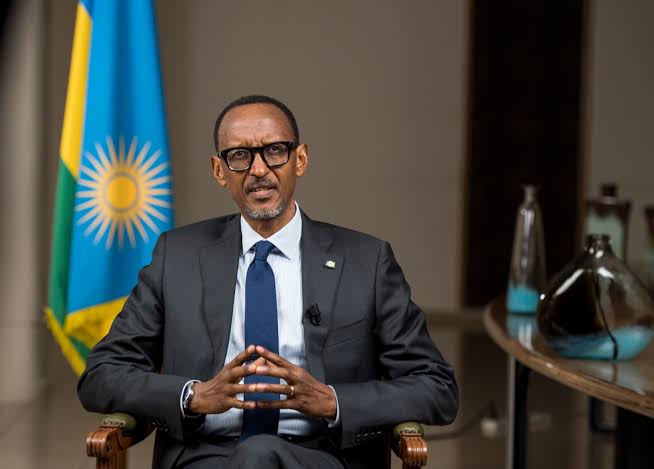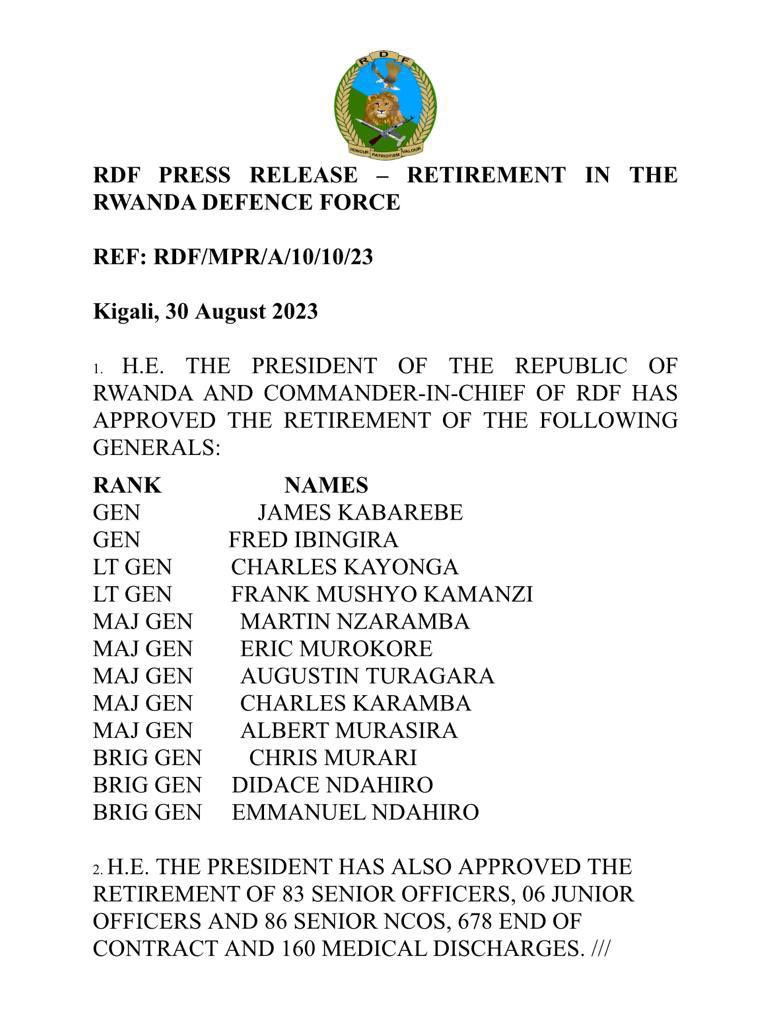
Paul Kagame of Rwanda
Coup fears: Rwanda’s Kagame retires 12 generals, nearly 1000 others
Barely hours after his Central African counterpart leader, Mr Paul Biya had reshuffled Cameroun’s defence structure, Rwandan President, Paul Kagame, Thursday, announced sweeping changes in the military, in what is believed to be aimed at forestalling any coup attempt in the East African country.

Coups have become rife in Africa as in one year alone, four military takeovers have taken place, including two in August 2023, involving Niger Republic in West Africa, and Gabon in Central Africa.

The changes announced by President Kagame who has been office for over two decades included retirement of 12 army generals, and nearly 1000 other Army officers and the redeployment of others.
A notice seen by Oracle Today newspapers, Thursday, disclosed that the officers were retired, on August 30 following a directive from Kagame.
In the development, Kagame approved the retirement of 924 military personnel, including 83 Senior Officials, 86 Senior Non-Commissioned Officers, 6 Junior Officers.
678 affected were end of contract retirements. In addition, 160 soldiers were discharged on medical grounds.
Rwanda’s Kagame belongs in the list of Ad=frican ;leaders who have spent over 20 years in office through several reelections, mostly questionable ones.
Others in that list include: Yoweri Museveni of Uganda- 37 years; Teodoro Mbasogo of Equatorial Guinea- 44 years; Paul Biya of Cameroon- 48 years; Denis Nguesso of Congo- 38 years; Isaias Afwerki of Eritea- 30 years; and Ismail Omar Guelleh of Djibouti- 24 years.

They follow in the footsteps of now late, exiled, deposed or incapacitated African leaders who stayed even longer in office, including: Jose Eduardo dos Santos of Angola- 38 years (1979 – 2017); Idriss Deby of Chad- 31 years till death; Omar Al-Bashir of Sudan 30 years (1989 – 2019); Gnassingbe Eyadema of Togo- 38 years (1967 – 2005); Abdelaziz Bouteflika of Algeria- 20 years who ruled the country from a wheelchair, forced to resign (1999 – 2019); Robert Mugabe of Zimbabwe- 37 years (1980-2017); and Yahya Jammeh of The Gambia: 22 years (1996 – 2017).
Meanwhile, reacting to the sudden changes in defence structures across the continent, former senator representing Kaduna Central Senatorial Zone at the National Assembly, Shehu Sani attributed the reshuffling of military apparatus in some countries to the ‘fear of coup.’
Posting comment via his X handle (@ShehuSani), Thursday, Sani wrote: “The fear of coup has prompted some African leaders to resetting their military instead of resetting their governance system.”
In far away Cameroun, President of Cameroun, Mr Paul Biya, has reshuffled the high command at the Defence ministry, in the wake of the coup which occurred in the neighbouring Central African nation of Gabon, early Wednesday, which ousted Ali Bongo Ondimba.
The now 90-year-old Mr Biya has ruled Cameroun for over five decades in power was said to have announced sweeping changes to the military high command, Wednesday evening to avert a possible overthrow of his government by soldiers.
Biya announced significant changes in the central administrative unit at the Ministry of Defence, as he appointed key personnel at the internal and external services of the Ministry.
In a decree dated August 30th, 2023, Biya appointed new staff members at the Ministry of Defence’s central administrative division.
He also issued a series of decrees, appointing the Rector of the University of Ngaoundere, officials in some Universities, and another transforming the Consulate of the Republic of Cameroon at Ouesso, Republic of Congo, into a General Consulate.
Biya who has been Cameroon’s President since 1982, was previously the country’s the Prime Minister from 1975 to 1982.
Biya who is Africa’s second-longest serving leader, will complete his mandate in 2025. However, some Camerounians are still urging him to seek an eighth term in office.
Cameroun has been engaged in a civil unrest arising demand for secession by the English-speaking Southern region, Ambazonia in their call for self-determination.
If a coup does take place in Cameroun, it would mean all three neighbouring countries surrounding Nigeria now have military rulers; including Chad and Niger Republics, with the exception of Benin Republic, all in West Africa alone.
Meanwhile, the military officer believed to have led the coup in neighbouring Gabon, on Wednesday, General Brice Oligui Nguema has dismissed report claiming he is now the new leader of the country.
“I do not yet declare myself as the head of the Gabonese state. I do not envision anything at the moment. This is a debate we are going to have with all the generals.
“Let’s meet again at 14:00 GMT (Thursday). It’s all about clearing a consensus. Everyone will submit ideas and the best ones will be chosen, along with the name of the one who will lead the transition,” Gen Nguema said.
It would be recalled that neighbouring Gabon had witnessed a coup on Wednesday by soldiers who rejected and invalidated the recently conducted general elections that had returned incumbent president, Ali Bongo Ondimba in office after four decades of his family ruling the country.
The Gabon coup follows the yet-to-resolved July 26 Niger coup in West Africa.
Army officers in Gabon had confirmed, Wednesday, that the ousted civilian president, Ali Bongo is under house arrest.
This is also as the deposed president, Wednesday, dispatched a broadcast message via the internet to Gabonese urging them to make ‘noise’ against the coup plotters.
The officers announced their coup early Wednesday morning on national television channel Gabon 24, just moments after the nation’s election commission had announced that Bongo had won a third term in Saturday’s general elections.
The officers said that the election results were invalidated, all state institutions dissolved and all borders closed until further notice.
“We have decided to defend the peace by putting an end to the current regime,” one of the officers said.
Hours after the initial announcement, the officers released another video claiming they had detained Bongo.
Bongo first took office in 2009, after the death of his father, Omar Bongo who had become president of the oil-rich nation in 1967.
The Central African nation has a population estimated to be 2.4 million people but with nearly half of it impoverished.
Saturday’s elections were overshadowed by a lack of international observers, raising concerns about transparency.
Afterwards Bongo’s government curtailed internet service and imposed a nightly curfew across the nation, saying it was necessary to prevent the spread of misinformation.
Gunfire was heard throughout Gabon’s capital, Libreville, after the officers’ initial television appearance.
Residents later poured onto the streets of Libreville to celebrate news of Bongo’s removal.
The declared coup comes on the heels of last month’s military overthrow of President Mohamed Bazoum of Niger, the latest in a series of coups across West and Central Africa since 2020.
President Bongo survived an attempted military takeover in January 2019 as he was recovering from a stroke.



